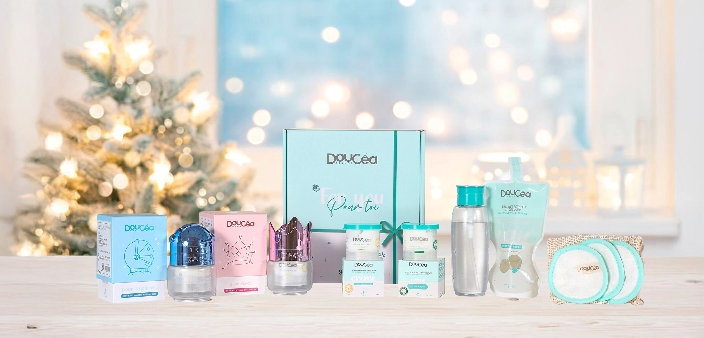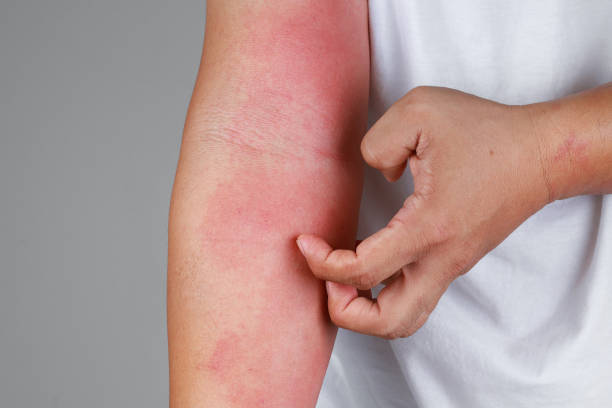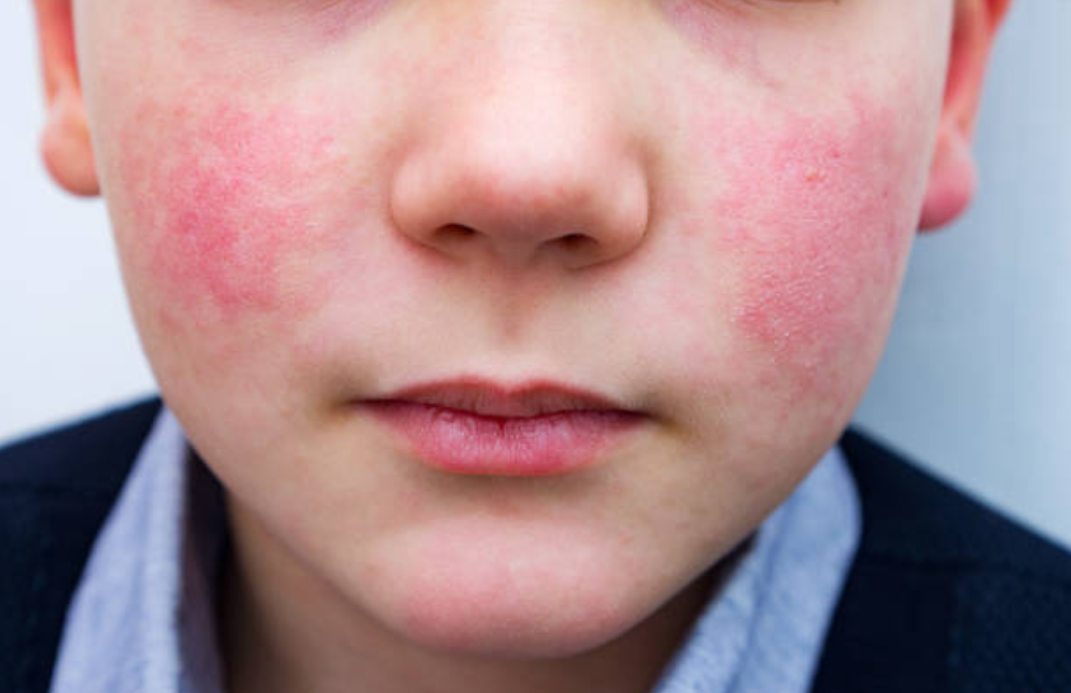Redness, itching, and other skin irritations can affect the entire family — from babies to adults.
When looking for an effective anti-irritation treatment for both adults and children, it’s reassuring to know that dermocosmetic solutions exist to soothe sensitive skin at every stage of life. In this article, we explain the causes and symptoms of skin irritation in both young and older individuals, the specific characteristics of sensitive skin in babies, children, teenagers, and adults, and introduce you to Doucéa creams — prebiotic-rich protective treatments designed for the whole family. We’ll highlight their natural composition, benefits, and various uses (face, body, diaper area, etc.). Real-life examples and testimonials will illustrate the effectiveness of Doucéa products, and we’ll conclude with practical tips to prevent and treat everyday irritations. The tone is professional and reassuring, aimed at helping every parent or individual with sensitive skin find the right solutions for soothed, healthy skin.
Causes and Symptoms of Skin Irritations
Skin irritation is the result of a weakened skin barrier that leads to localized inflammation. Redness, swelling, patches, burning sensations, tightness, or itching are common signs of irritated skin. These symptoms can appear on various parts of the body (face, arms, legs, hands, skin folds, intimate areas, etc.) and cause significant daily discomfort. Identifying the cause is essential for proper treatment and to prevent the condition from worsening. Most everyday irritations are triggered by repeated exposure to external irritants. Among the most frequent causes are:
- Physical or environmental aggressors:
Excessive rubbing from clothing or diapers on the skin, cold and windy weather, sun exposure without protection, or dry air can all damage the skin barrier and lead to redness and dryness. For example, wearing a face mask or scarf that rubs against the skin can cause facial irritation, just like thigh chafing in athletes who sweat. Likewise, a child playing outside in cold weather may return with red, stinging cheeks due to harsh wind.
- Chemical irritants or unsuitable products:
Using harsh soaps or body care products not formulated for sensitive skin can cause irritation in both children and adults. Scented laundry detergents or fabric softeners, lotions with alcohol or synthetic fragrances, or poorly tolerated cosmetics can trigger redness and itching on reactive skin. For instance, an adult with sensitive hands may develop a rash after using cleaning products without gloves, or a teenager may experience tightness after using an overly stripping facial cleanser.
- Humidity and maceration:
Excessive sweating or prolonged contact with moisture can promote irritation. In babies, the main cause is prolonged exposure to urine or stool in a diaper, leading to diaper rash. A diaper that’s too tight or not absorbent enough can cause maceration and irritation in the delicate skin of the diaper area. Similarly, skin folds (neck, thighs) may become irritated by sweat or saliva, especially when teething. In adults, sweat trapped under tight or synthetic clothing can also cause irritation — for example, under the breasts or between the toes.
- Biological or medical causes:
Sometimes, irritation is linked to an atopic or allergic predisposition. Atopic dermatitis (eczema) is a common condition in babies and children and may persist into adulthood. It presents as very dry, red, and itchy patches — often behind the knees, on the arms, or the face. Atopic skin has a more permeable barrier and an inflammatory tendency. Other irritations can be of infectious origin (e.g., a viral rash or fungal infection) or allergic origin (from contact with allergens such as nickel, certain plants, or animal dander). However, true allergic reactions typically include blisters, swelling, or oozing lesions. If there is any doubt about an allergy or infection (e.g., oozing wounds, fever), it is recommended to consult a doctor.
In summary, irritation is not the same as an allergy — it is most often a localized reaction caused by an external irritant or excessive skin dryness. These irritations can occur at any age, but certain causes are more specific depending on whether it affects a baby, child, teenager, or adult. Below, we explain the particularities of irritation and sensitive skin for each age group.
Skin Irritations in Babies and Young Children
From the very first months of life, a baby’s skin can show signs of irritation. Infant skin is extremely thin and immature, which makes it particularly vulnerable to everyday aggressors. At birth, a baby’s skin barrier is not yet fully developed and will only become more robust around the age of two. The hydrolipidic film — the skin’s natural protective layer — is also fragile in infants. As a result, a baby’s skin becomes dehydrated quickly and is easily irritated if not properly protected.
The most common causes of irritation in babies are related to this skin immaturity and the baby’s immediate environment. Diaper rash is a perfect example: the combination of friction from the diaper, moisture, and contact with irritating substances (urine, stools) causes intense redness on the buttocks and groin folds. Even when well cared for, a baby may still experience redness during the crawling or walking stage (more movement and friction), or during teething (more acidic stools). Facial irritations are also common — such as small red patches on the cheeks in winter due to cold weather, or perioral dermatitis caused by saliva (common when teething or drooling heavily). Atopic dryness is also frequently observed in predisposed infants: their skin becomes rough, with itchy patches (infantile eczema). This type of irritation, linked to atopy, can fluctuate in severity and requires regular hydrating and soothing care to prevent secondary infections from scratching.
Some other common causes of irritation in infants include hard water (which dries the skin during bathing), rough clothing (like wool worn directly against the skin), or excessive heat, which may cause redness and heat rash (also called “miliaria” or “prickly heat”).
In toddlers and school-aged children, the skin becomes thicker and slightly less fragile than at birth, but it remains thinner and more sensitive than adult skin. A 5- or 8-year-old child, for example, may develop red cheeks quickly after playing outside in winter or experience mild itching after sweating from physical activity. Children also tend to get dirty and come into contact with various elements like dirt, sand, or grass, which can irritate exposed areas (mild redness behind the knees, slight inflammation around scratches, etc.). These minor irritations are usually harmless, but they justify the use of ultra-gentle, hypoallergenic hygiene and care products to avoid worsening skin sensitivity.
It’s worth noting that many children naturally have sensitive skin. It is estimated that about one in three children has very sensitive skin — meaning it is reactive and easily reddens when exposed to irritants. That’s why it’s essential to choose appropriate care products from an early age to protect fragile skin and prevent everyday irritations from turning into more serious issues.
Skin Irritations and Sensitive Skin in Teenagers
Adolescence is a time of major changes for the skin. Due to hormonal fluctuations, a teenager’s skin often produces more sebum, increasing the likelihood of acne. However, that doesn’t mean it can’t be sensitive. In fact, teenagers often have more sensitive skin than adults, with a higher tendency to experience redness and irritation.
This paradox of oily yet sensitive skin can be explained by several factors. On one hand, acne treatments or cleansing routines used by teenagers are often drying, which weakens the skin barrier and causes irritation (e.g., flaking around blemishes, stinging sensations from alcohol-based products, etc.). On the other hand, adolescent skin is constantly evolving and may react strongly to external aggressors such as strong fragrances, unsuitable makeup, or excessive sun exposure without protection.
Signs of irritation in teenagers may include general redness (such as flushed cheeks after using a harsh scrub), dartres (dry patches, often on the arms or face in winter), or increased sensitivity on treated areas. A teenager undergoing acne treatment often has very dry skin, especially in areas not affected by breakouts, resulting in tightness and discomfort.
Additionally, teens may also experience atopic eczema, either as a continuation from childhood or with new onset during adolescence. This manifests similarly to adult atopic dermatitis — dry, red, itchy patches in areas like the elbows, neck, or behind the knees. Since appearance plays a major role during adolescence, these skin concerns can significantly impact self-esteem.
Don’t worry — with the right daily habits and appropriate skincare, the comfort of teenage skin can be significantly improved. A daily moisturizer is essential to reduce irritation and protect the skin’s weakened barrier, ideally using formulas that are gentle, non-greasy, and non-comedogenic (i.e., do not clog pores). It’s also important to avoid irritating ingredients such as sulfates, alcohols, or parabens.
This is exactly what Doucéa skincare products offer: soft, lightweight creams free from harsh ingredients or overly rich textures — perfectly suited to moisturize and soothe teenage skin on a daily basis.
Skin Irritations and Sensitive Skin in Adults
In adulthood, the skin reaches full maturity and thickness — but that doesn’t make it invincible. Far from it. Many adults report having sensitive skin that reacts with stinging, tightness, or redness when exposed to external aggressors or certain products. The causes of irritation in adults partly overlap with those in children (cold, wind, friction, harsh chemicals…), but are compounded by lifestyle habits and professional environments.
Common skin irritations in adults include: contact dermatitis (irritation from prolonged exposure to an irritating substance or material, such as hand rashes caused by alcohol-based hand gels or latex gloves), razor burn in men after shaving (small red bumps on the neck), post-waxing irritation on women's legs, or underarm irritation from friction and sweating, especially when using an unsuitable deodorant.
Adults can also suffer from allergic contact eczema (a true allergic reaction, for example to nickel in jewelry or certain cosmetic ingredients), or from rosacea (a chronic condition causing redness and heat on the face). Stress and fatigue are also frequently reported aggravating factors: a stressed adult may develop dry patches or unexplained itching (known as nervous hives), and a fast-paced lifestyle can throw the skin’s balance off.
Let’s not forget that skin ages: as we grow older, mature skin produces less sebum and tends to become drier and thinner, which in turn can make it more prone to irritation (e.g., senile itching, or “crocodile skin” on the legs of older adults). That’s why it’s important to continue caring for your skin as an adult — by protecting it from external stressors (gentle clothing, sun protection, avoiding overly harsh products) and maintaining good daily hydration.
In summary
At any age, irritated skin requires gentle, appropriate care. Thankfully, there are skincare products specifically designed to soothe irritation and protect sensitive skin for the whole family. Among them, the Doucéa cream range offers innovative, natural solutions for babies, children, teenagers, and adults with delicate skin.
Doucéa creams provide natural anti-irritation care (99% naturally derived ingredients, cortisone-free) in fun, refillable containers — all proudly made in France for the whole family.
Doucéa’s Solutions to Soothe Irritated Skin for the Whole Family
To address skin irritations, Doucéa has developed a line of dermo-cosmetic treatments designed for all sensitive skin types — from infants to adults. Doucéa is a French skincare brand with a unique concept: its founder, a pharmacist and mother, co-created the products with the help of 400 children, ensuring the formulas are effective and appealing to young users.
The result? High-tolerance creams, made with safe, natural ingredients, paired with playful and eco-friendly packaging. This approach gives parents full confidence while encouraging children to enjoy using their cream themselves each day.
Natural, Minimalist, and Highly Effective Dermo-Cosmetic Creams
Effectiveness and safety are at the core of Doucéa’s formulations. The products contain up to 99% naturally derived ingredients, with no undesirable components. Doucéa creams are guaranteed free from controversial substances, endocrine disruptors, harsh fragrances, or potentially irritating essential oils — making them safe for the whole family to use.
The founder, Dr. Natacha Tarascon, developed minimalist, hypoallergenic formulas to reduce allergy risks and suit all types of sensitive skin. These include a synergistic complex of prebiotics that protects the skin’s microbiome, helps balance its natural flora, and strengthens the skin’s protective barrier. This microbiome-focused approach is innovative: by feeding the skin’s “good bacteria,” it becomes more resilient to external irritants.
When it comes to soothing and reparative ingredients, Doucéa has drawn on the best of nature. For example, Centella Asiatica (also known as Tiger Grass) is included in the form of Madecassoside — a plant-based compound recognized for centuries for its healing properties. Madecassoside is a powerful natural anti-inflammatory that reduces redness and calms skin irritation. The creams also contain a trio of nourishing plant oils (sweet almond, sunflower, and jojoba) to soften and restore delicate skin, along with a blend of moisturizing sugars (xylitol and derivatives) that provide deep and long-lasting hydration. Vitamin E is also included as an antioxidant to protect the skin from environmental aggressors and support regeneration.
Another standout feature of Doucéa is its innovative packaging. The creams come in refillable containers with a smart airless pump: each press dispenses the perfect amount of cream without introducing air or contaminants. This system ensures excellent hygiene (no fingers in the jar) and preserves the formula without unnecessary preservatives.
Moreover, the colorful, playful packaging — shaped like astronauts, cute little monsters, etc. — encourages children to take part in their skincare routine. Applying cream becomes a fun activity rather than a chore. The refills also help reduce plastic waste, which is a welcome eco-friendly bonus for environmentally conscious families.
For example, the mother of a 4-year-old boy shared: “My son loved the blue astronaut container. He wanted to learn how to press it himself to apply his cream every night! Not only is his dry skin much better, but he’s also proud to take care of himself like a big boy.”
This testimonial perfectly captures Doucéa’s spirit: making skincare effective, safe, and fun for the whole family.
The Doucéa range currently includes two complementary creams, as well as an ultra-gentle micellar cleansing water. Let’s focus on the two creams, each designed for a specific need: Apaiséa for daily hydration of sensitive skin, and Doutopia for treating very dry or atopic-prone skin. These two anti-irritation treatments address most common skin concerns — whether it’s the body, face, dry hands, or even irritated baby bottoms.
Apaiséa Cream: Daily Hydration and Protection for Sensitive Skin
Doucéa's Apaiséa cream lives up to its name: it is a soothing and protective treatment for sensitive, dry, or fragile skin at any age. Its primary role is to provide optimal daily hydration and to prevent irritation by strengthening the skin barrier. With 98.7% naturally derived ingredients, Apaiséa offers a pure formula that hydrates, protects, and effectively soothes the epidermis.
It features Doucéa’s signature prebiotic complex, combined with floral and plant-based ingredients known for their benefits. Notably, cornflower floral water is included – this flower water is traditionally used to calm irritation and redness (it's known for soothing tired eyes, but it's just as beneficial for the skin). Sweet almond oil, rich in nourishing fatty acids and vitamin E, complements the formula by softening the skin and reducing tightness. Apaiséa contains no artificial fragrance, alcohol, or harsh ingredients: its light texture absorbs quickly, leaving no greasy film, making it ideal for daily use on all body areas in need.
The tangible benefits of Apaiséa are quickly noticeable: well-hydrated skin feels more comfortable, softer, and less reactive. With daily application, diffuse redness diminishes and skin no longer feels tight. This cream acts as a hydrating shield, protecting sensitive skin from external aggressions (cold, wind, clothing friction) by maintaining its hydration level and strengthening its protective barrier. It is a valuable ally to prevent recurring irritation.
Areas of use: Apaiséa can be applied to both the face and any targeted body areas. Apply it to your child’s red cheeks before school in winter, or to dry skin after sports activities (e.g., swimming) or after sun exposure.
Use case: Sophie, mother of a little girl with sensitive skin, shares: “My 6-year-old daughter has always had sensitive skin that turns red easily, especially on her arms and thighs after showering. On our pharmacist’s advice, I started applying Apaiséa every night after her bath. The results were amazing: her skin became soft and supple again, and no more rough, itchy patches! Plus, the cream isn’t sticky and absorbs quickly, which is great for dressing her right after. Now, it's a ritual: she asks for her 'magic cream' and feels proud to care for her skin all by herself.” (Fictional testimony inspired by real cases.)
In summary, Apaiséa is the perfect daily skincare product to prevent irritation: think of it as an upgraded moisturizing lotion that nourishes, soothes, and protects. The whole family can benefit: from a baby with dry tummy skin, to a mom with hands irritated by the cold, or a little boy with red cheeks after playing outside. This versatile anti-irritation treatment deserves a spot in every family’s bathroom.
Doutopia Cream: Repair and Relief for Very Dry or Atopic Skin
While Apaiséa meets daily needs, Doucéa’s Doutopia cream is designed for more demanding situations. It’s the SOS treatment for very dry or atopic-prone skin – skin prone to eczema and chronic irritation. Doutopia is the ideal cream to soothe, reduce redness, and deeply nourish irritated skin areas.
Thanks to its patented complex combining natural sugars, madecassoside, prebiotics, and sweet almond oil, it delivers instantly soothed and hydrated skin, even during flare-ups. In practical terms, this means that from the first application, itching is calmed, burning sensations are soothed, and the skin begins deep repair.
Doutopia shares several key ingredients with Apaiséa (prebiotics, plant oils, moisturizing sugars) but stands out with its higher concentration of madecassoside, the Centella Asiatica-derived active we previously discussed. This gives Doutopia superior healing and anti-inflammatory power, especially beneficial for eczema-prone or severely dry skin. Additionally, Doutopia’s texture is slightly richer while remaining fluid and non-greasy. It forms a protective film on the skin, helping to fill micro-cracks in the skin barrier. However, it doesn’t leave a sticky residue: it absorbs quickly, and the skin doesn’t appear shiny afterward. This makes it suitable for both face (even before makeup for adults) and body areas, with no discomfort.
Typical uses: Doutopia is recommended for all situations requiring intense skin repair. For example, it can be applied to red, dry patches on a baby with atopic eczema (cheeks, elbow creases, knees) once or twice a day. The cream quickly calms redness and itching, preventing excessive scratching, and helps the skin recover faster between flare-ups. Another example: a teenager with skin dried out from harsh acne treatments can use Doutopia in the evening on flaky areas to restore and deeply hydrate irritated skin. For adults with extremely dry or damaged areas (e.g., mild psoriasis plaques, skin irritated by dermatological treatments, winter facial rough patches), Doutopia is also a valuable solution: it's concentrated enough for the roughest or most damaged spots and offers immediate relief, while still being gentle enough for sensitive, reactive skin.
Testimonial: Karine, 32, has had atopic skin since childhood: “I get recurring eczema, especially on my hands and arms. I’ve tried many OTC creams, but most sting or aren’t rich enough. For a few weeks now, I’ve been using Doucéa’s Doutopia cream and I’m thrilled: as soon as my patches start to itch, I apply a dab and the itching stops within minutes. My redness has greatly decreased and my skin no longer flakes. What I love is that the cream isn’t greasy at all: I can apply it during the day without feeling sticky, and even my husband uses it for his chapped hands. We finally found a treatment that works for both of us!” (Fictional testimonial.)
In summary, Doutopia is the intense repair treatment to have on hand when sensitive skin acts up. Suitable from birth and for the whole family, it offers a professional dermo-pediatric response to extreme dryness and stubborn irritation. Using it in combination with Apaiséa creates a complete routine: Apaiséa for daily care on the whole body, and Doutopia for targeted treatment of problem areas. With this winning duo, even the most demanding atopic skin can remain soft, comfortable, and protected day after day.
The Doucéa astronaut case, shown open here, dispenses the right amount of cream without external contamination. The leaves in the image symbolize Centella Asiatica, from which the soothing and healing madecassoside in Doutopia is extracted.
Practical Tips for Preventing and Treating Skin Irritations
Alongside treatments like Doucéa creams, here are some practical tips to help prevent skin irritations and soothe sensitive skin on a daily basis:
- Hydrate the skin daily: this is the number one rule. Well-hydrated skin defends itself better against external aggressors. Apply a cream or lotion suited for sensitive skin (preferably hypoallergenic and fragrance-free) every day. For example, after a bath or shower, moisturize your baby’s skin from head to toe, including often dry areas like knees, elbows, and cheeks. Adults should also integrate hydration into their morning or evening routine, especially on tight-feeling areas (face, hands, legs). Doucéa’s Apaiséa and Doutopia creams, rich in soothing actives, are perfectly suited for this daily use.
- Use gentle cleansing products: for washing, choose soap-free cleansers (syndets), lipid-enriched gels, or bath oils specially formulated for sensitive or atopic skin. Avoid heavily fragranced shower gels or those containing harsh sulfates. For babies, Doucéa’s micellar water can be very convenient: rinse-free and made of 99.8% natural ingredients, it gently cleanses the skin (face, folds, diaper area) while soothing and preventing dryness. Limit bath time and use lukewarm rather than hot water (hot water can dry out the skin). After bathing, gently pat the skin dry with a towel rather than rubbing vigorously.
- Prevent diaper rash: for babies, change diapers frequently to avoid prolonged contact with moisture. Clean the diaper area with a gentle product (oleo-calcareous liniment, baby cleansing water), then dry carefully, paying attention to skin folds. Apply a thin layer of cream after each change to clean, dry skin. Specific creams with zinc oxide can create a moisture barrier. For daily use, a nourishing cream like Doucéa Apaiséa can help maintain healthy skin and soothe early redness. If a rash develops, leave the diaper off as much as possible and consult a doctor if open sores or infection appear.
- Avoid aggravating factors: identify what triggers or worsens your irritation and try to minimize it. For example, if your child gets skin irritation from sand or grass after playing outdoors, give them a quick rinse with clear water to remove irritants. If wool or synthetic fabrics cause reactions, opt for soft cotton clothing without irritating seams, and wash them with hypoallergenic laundry detergent. Adults should wear gloves during housework or DIY to avoid direct contact with irritating products (cleaners, solvents). In winter, wear warm gloves outside to prevent chapping, and in summer, don’t forget sunscreen – sunburns are a form of acute irritation that damages the skin.
- Don’t scratch and relieve itching: easier said than done, especially for children, but scratching worsens inflammation and can cause secondary infection. Trim young children’s nails to prevent accidental scratches. In case of intense itching, distract the child (with a toy, for example), or if you're an adult, gently massage the area with a cold cloth instead of scratching. Apply a soothing cream as soon as possible: massaging the area helps calm the urge to scratch, and calming ingredients (like madecassoside in Doucéa Doutopia, or calamine and colloidal oatmeal in other products) reduce irritation. If necessary, a doctor may prescribe oral antihistamines or topical corticosteroids for severe eczema flare-ups, but these should be used under medical supervision only.
- Maintain a healthy environment for the skin: daily life affects skin health. Ensure your home air isn’t too dry (use a humidifier in winter if needed, as heating dries out the air). Ventilate regularly to reduce allergen build-up. Internally, drink enough water to keep skin hydrated, and eat foods rich in essential fatty acids (fatty fish, nuts, high-quality vegetable oils) to strengthen the skin barrier. Finally, manage stress, a known aggravator of eczema and some skin eruptions: relaxation, adequate sleep, and calming activities can indirectly help the skin be less reactive.
By following these tips and using the right skincare like Doucéa’s range, you give yourself the best chance of preventing irritation and maintaining healthy, comfortable skin.
Conclusion
Skin irritation, whether it affects a baby, child, teenager, or adult, is not inevitable. By understanding its causes and knowing the specific needs of sensitive skin at each stage of life, it is possible to act effectively to soothe it. We have seen that the Doucéa brand offers high-quality anti-irritation treatments, formulated by experts and validated by families, to hydrate, protect, and repair fragile skin daily.
Their Apaiséa and Doutopia creams, rich in natural soothing ingredients (prebiotics, madecassoside, plant oils...), provide a safe and effective answer to redness, dryness, and itching in both children and adults.
With a suitable routine – gentle hygiene, daily hydration, avoidance of irritants – and the help of these dermo-cosmetic treatments, everyone can regain the comfort of soft, healthy skin. The professional and reassuring tone of this article aimed to guide you in managing everyday skin irritations.
Feel free to share these tips with other parents or anyone concerned with skin health. By adopting the right habits and trusting proven products like Doucéa, you can offer your family the best in anti-irritation care – for cuddles that feel good and happy skin at any age.
















